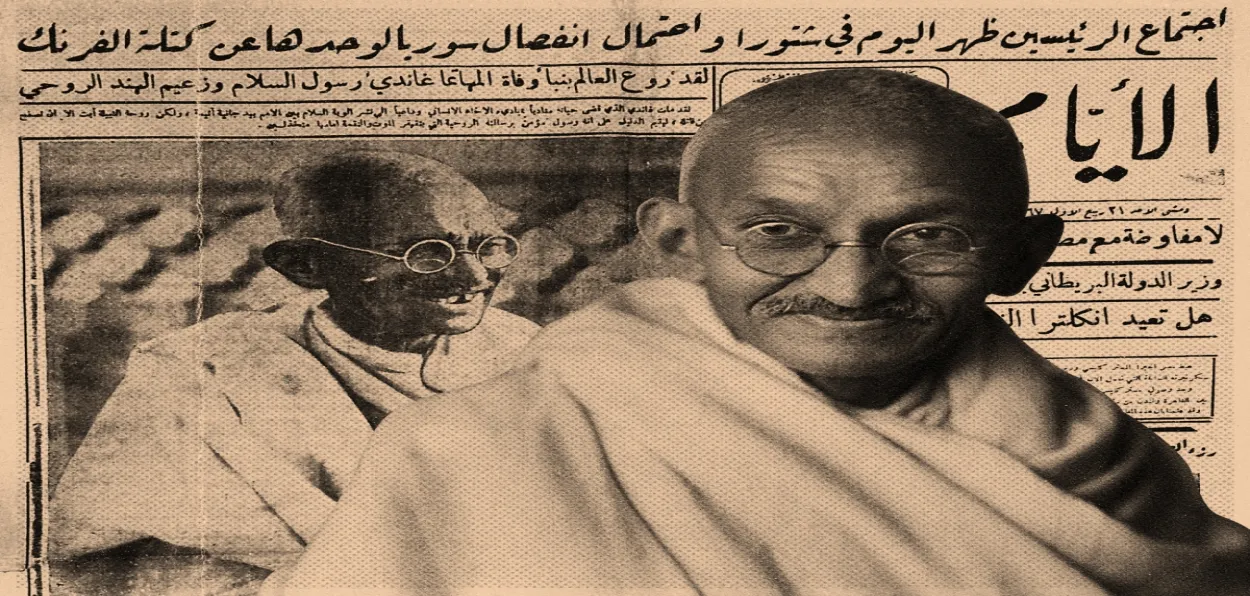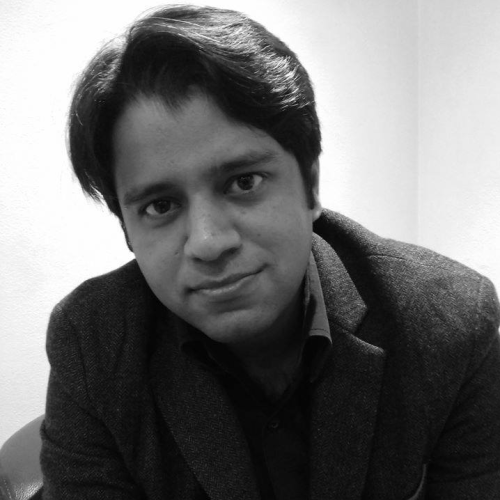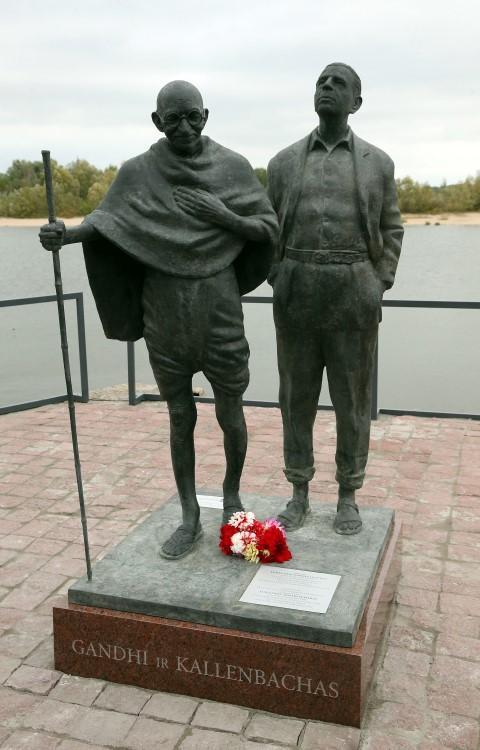
 Saquib Salim
Saquib Salim
Mohandas Karamchand Gandhi, better known as Mahatma (a Hindi word for sage) Gandhi, is the most influential person to have lived during the 20th century. Other illustrious figures who changed the course of history in the century were Lenin, Hitler, Mao, Ayatollah, Ho Chi Minh, etc. but none continued to be universally admired as Gandhi did.
Gandhi has emerged as a world leader and, unlike many other well-known Indian leaders; his appeal was not limited to India. Even though he was a colony citizen, the so-called superpowers of the time noticed him and tried to influence him. Mussolini is a case in point here. He invited Gandhi to visit Italy in the hope that a few words of appreciation by him would bolster his case.
One of the most important political events involving Gandhi which continues to echo to date in global politics was the demand for a Jewish State by the Zionists at the geographical location of the British mandate of Palestine. Right after the Balfour Declaration of 1917, the British government committed itself, under the pressure of rich Jews, to the creation of a Jewish state in Palestine. The only debate that divided the British was whether the whole of Palestine would become the Jewish State or a region within Palestine would be given to the Jews.
It is a less appreciated fact that Gandhi rose on the stage of Indian politics to speak for Palestine. Another rather well-known fact is about the Khilafat Movement and Gandhi’s support for it. This movement was aimed at saving Jerusalem from the political control of non-Muslims. On 16 March 1921, at the height of the Khilafat Movement, Gandhi told The Daily Herald, “No influence, direct or indirect, over the Holy Places of Islam will ever be tolerated by Indian Muslims. It follows, therefore, that even Palestine must be under Muslim control. So far as I am aware, there never has been difficulty put in the way of the Jews and Christians visiting Palestine and performing all their religious rights. No canon, however, of ethics or war can justify the gift by the Allies of Palestine to Jews.”
.jpg) Mahatma Gandhi, SoniaSchlesin, his secretary and Jewish friend Hermann Kallenbach
Mahatma Gandhi, SoniaSchlesin, his secretary and Jewish friend Hermann Kallenbach
Two days later at Nagpur, Gandhi said, “Many friends ask me whether we shall win Palestine also. I say, certainly we shall win even Palestine if you are prepared to turn yourselves into fakirs and if you remain peaceful.”
Gandhi wrote in The Young India on 23 March 1921, “By no canon of ethics or war, therefore, can Palestine be given to the Jews as a result of the War. Either Zionists must revise their ideal about Palestine, or, if Judaism permits the arbitrament of war, engage in a ‘holy war’ with the Muslims of the world with the Christians throwing in their influence on their side. But one may hope that the trend of world opinion will make ‘holy wars’ impossible and religious questions or differences will tend more and more towards a peaceful adjustment based upon the strictest moral considerations. But, whether such a happy time ever comes or not, it is clear as daylight that the Khilafat terms to be just must mean the restitution of Jazirut-ul-Arab to complete Muslim control under the spiritual sovereignty of the Caliph.”
I can go on quoting Gandhi more but the point here is not to quote him but to establish the fact that one of his finest, and highest, moments in Indian politics was the struggle to win Palestine for Arab Muslims. The movement is known as Khilafat Movement and is considered one of the finest displays of Hindu-Muslim unity. It was the time when Shankaracharya was arrested for promoting Islamic fatwa, Hindu leaders were invited to mosques, Muslim leaders spoke at Hindu community gatherings, etc.
A couple of years later the Khilafat Movement collapsed with the abolition of the Ottoman Caliph by the Allies in the aftermath of the First World War. Gandhi was not found to be expressing his opinion on the Palestinian question publicly because, for the Indian public, the subject did not matter much.
In October 1931, during the Round Table Conference in London, Gandhi gave an interview to The Jewish Chronicle where he reportedly said, “Zionism meaning reoccupation of Palestine has no attraction for me. I can understand the longing of a Jew to return to Palestine, and he can do so if he can without the help of bayonets, whether his own or those of Britain. In that event, he would go to Palestine peacefully and in perfect friendliness with the Arabs. The real Zionism of which I have given you my meaning is the thing to strive for, long for, and die for. Zion lies in one’s heart. It is the abode of God. The real Jerusalem is the spiritual Jerusalem.”
Gandhi clearly showed that his view of the Palestinian problem had not changed much since 1921. He believed, and preached, that the political rights over Palestinian territory should belong to Arabs while Jews from Europe should be completely free to visit, or even settle, in harmony with the locals.
In the 1930s, the Zionist Movement to demand a Jewish State in Palestine was at its peak. Gandhi was one of the tallest, if not the tallest, political leaders of the time. The world took notice of his views. To create a favourable world opinion it was important, if not necessary, for the Zionists to get Gandhi’s approval for the scheme of Israel.
In 1936, the Political Department of the Jewish Agency, an organization recognized by the British Government as a representative body of the Jews that was fighting for the creation of Israel, sent Dr. Immanuel Olsvanger, a Jewish Sanskrit Scholar, to influence Gandhi’s opinion on Israel. Olsvanger directly reported to senior leaders Moshe Sharett (He later became Prime Minister of Israel) and Chaim Weizmann (the First President of Israel).
The fact that Olsvanger knew Sanskrit and had also lived in South Africa, where Gandhi had also lived, made him a choice to influence the Indian leader. Though he could not succeed much, he told Sharett about Hermann Kallenbach, a close friend of Gandhi in South Africa and a leader of South African Zionists.
Sharett wrote to Kallenbach, “You are in a unique position to help Zionism in a field where the resources of the Jewish people are so meager as to be practically inexistent.” Kallenbach was asked to accompany Olsvanger but did not join him during the latter’s visit to India in October 1936.
In April 1937, Sharett, Weizmann, and Olsvanger met Kallenbach in London to make him understand the urgency. The talks of Olsvanger with Gandhi had failed and the Indian National Congress did not change its pro-Arab stand. As a result, in May 1937 Kallenbach came to India, met Gandhi, and lived with him for a few weeks.
Kallenbach writes, “Bapu approached, and embraced me -i- put to me the question "After how many years?". "23", I answered. "We all had despaired of your coming. Come into the light, so that I can have a good look at you." He drew me into a room, and with a lantern he lighted up my face and my head and touched my hair. "Your hair has turned grey, just like mine." Then he asked me many questions.”
 A statue of Friendship of Gandhi and Kallenbachas in the Lithuanian town of Rusne
A statue of Friendship of Gandhi and Kallenbachas in the Lithuanian town of Rusne
Gandhi preached non-violence to Kallenbach as well. He did not want bloodshed in the name of Palestine or Israel. In an unpublished statement in 1937, Gandhi said, “In my opinion, the Jews should disclaim any intention of realising their aspiration(s), under the protection of arms and should rely wholly on the goodwill of Arabs. No exception can possibly be taken to the natural desire of the Jews to find a home in Palestine. But they must wait for its fulfillment, till Arab opinion is ripe for it. And the best way to enlist that opinion is to rely wholly upon the moral justice of the desire and therefore the moral sense of the Arabs and the Islamic world.”
As a result of these talks, Kallenbach started having second thoughts about the goal of the Zionist Movement. On 1 July 1937, he wrote to Weizzman, “(And) otherwise accepting the position that we are able to prepare ourselves for self-defense in Palestine (, can) a comparatively speaking, a handful of Jews defend itself against the many millions of the Islamic world who believe that notwithstanding the promises of Britain & the League of Nations, we had & have no right to enter Palestine without the goodwill of the Arabs? Is it wise to force the position of further relying entirely on British protection & on our own self-defense?"
Maulana Abul Kalam Azad and Jawaharlal Nehru also met Kallenbach on the insistence of Gandhi. They offered to mediate between Arabs and Jews. You can pause for a moment and think that a colonised India was this important in global affairs.
Weizmann was informed by Kallenbach, "Both think that by direct conversation between Arabs and Jews only, will it be possible to reach an understanding and they believe the time ripe now for such conversations. They are willing to assist in bringing about these conversations when called upon to do so, so is Mahatma Gandhi. The Mohammedan population of India, being 70,000,000, is by far the most important one in the world. The intervention of some of their leaders with a view to reach conciliation, may have far-reaching results. What do you think about it?"
In July 1937, Kallenbach returned from India but Gandhi remained in talks with different Jewish representatives. Gandhi could not agree on the political partition of Palestine on religious lines. It has been observed by multiple scholars that if Gandhi and Congress had agreed upon the partition of Palestine, and the establishment of a Jewish state, based on religion it would have made their position on Pakistan's demand of Mohammad Ali Jinnah ambiguous.
The nationalist politicians believed that any partition based on religion was being forced by the colonial rulers. The yardstick for Palestine could not be different. Gandhi explained his stand in an article titled The Jews published in Harijan on 26 November 1938.
Gandhi wrote, “Palestine belongs to the Arabs in the same sense that England belongs to the English or France to the French. It is wrong and inhuman to impose the Jews on the Arabs. What is going on in Palestine today cannot be justified by any moral code of conduct. The mandates have no sanction but that of the last war. Surely it would be a crime against humanity to reduce the proud Arabs so that Palestine can be restored to the Jews partly or wholly as their national home.”
The article was pro-Arab where Gandhi declared, “I am not defending the Arab excesses. I wish they had chosen the way of non-violence in resisting what they rightly regarded as an unwarrantable encroachment upon their country. But according to the accepted canons of right and wrong, nothing can be said against the Arab resistance in the face of overwhelming odds.”
ALSO READ: AMU's Suhail Sabir donates Rs 50 lakh for students' scholarships
Once the World War was over and Israel was looking like a reality, Gandhi wrote on 14 July 1946, “In my opinion, they (Jews) have erred grievously in seeking to impose themselves on Palestine with the aid of America and Britain and now with the aid of naked terrorism….. Why should they depend upon American money or British arms to force themselves on an unwelcome land? Why should they resort to terrorism to make good their forcible landing in Palestine? If they were to adopt the matchless weapon of non-violence whose use their best Prophets have taught and which Jesus the Jew who gladly wore the crown of thorns bequeathed to a groaning world, their case would be the world’s and I have no doubt that among the many things that the Jews have given to the world, this would be the best and the brightest. It is twice as blessed. It will make them happy and rich in the true sense of the word and it will be a soothing balm to the aching world.”
